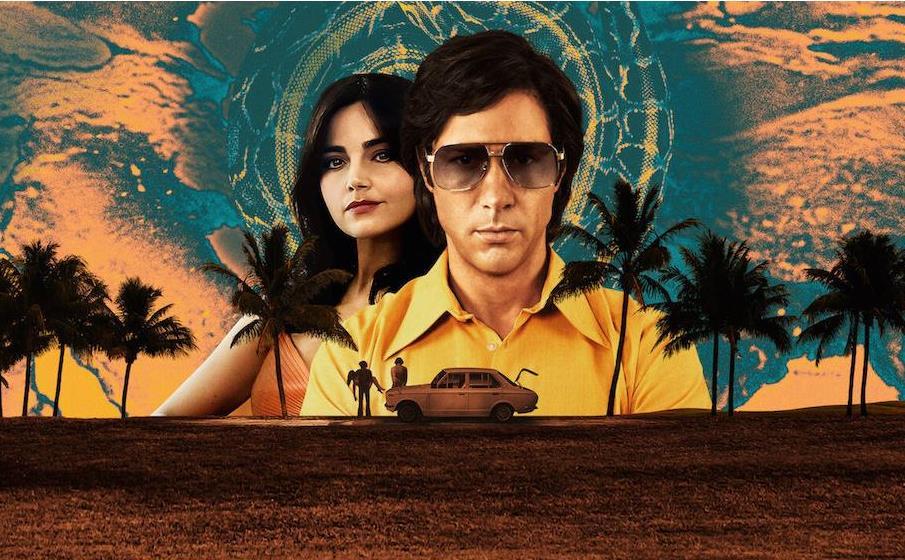The Sons of Sam: A Descent Into Darkness
Netflix’s The Sons of Sam: A Descent Into Darkness is a documentary series that manages to tell you no more, at the end of its fourth and final episode, than it did in the opening ten minutes of its first episode. Did David Berkowitz, the self-proclaimed ‘Son of Sam’, act alone in his horrific killing spree of the mid 1970s? If not, was he part of a Satanic cult? And why did certain people to whom Berkowitz can be linked die so soon after his arrest, and in such odd circumstances? Is there still the same evil cult out there, at large, ready to strike down innocent people?
None of this can be proved beyond the evocation of a spooky, circumstantial web of coincidences, clues and inferences. Which is exactly what director Joshua Zeman (his previous TV credits include Killer Legends and The Killing Season) labours mightily to evoke over the total four hours of the series. A ‘descent into darkness’ is what he hopes viewers will experience. Certainly, there ain’t much light at the end of this tunnel.
I admit it: I am the target audience for stuff like this, whether it turns out to be ‘quality’ or dross, illuminating or mystifying. I just eat it up. Serial killer fiction has long been a pop culture obsession, starting somewhere in that baleful ‘assassination decade’ of the 1960s. Like every baggy genre, it has undergone waves and variations, parodies and meta-takes. (For the most outré extreme, I recommend the collected works of former Fassbinder and Warhol associate Ulli Lommel, whose delirious, low-budget quickies like to tie all the famous serial killers up into one, enormous conspiracy!) Taking a dive into the current serial killer stream, I come up with a few observations on where the genre is at present.
There is an intriguing, movie-crazy edge to The Sons of Sam. It is full of echoes of and allusions to films high and low.
There is an intriguing, movie-crazy edge to The Sons of Sam. It is full of echoes of and allusions to films high and low. Actor Paul Giamatti’s unmistakeably dulcet tones fill the soundtrack as narrator. Early on, in a blistering montage conjuring up the paranoiac ambience of America in the 1970s, I believe I detected a snippet from a sensationalist documentary that scared the heck out of me when I was 21: The Killing of America (1981) directed by Sheldon Renan (author of The Underground Film) and written by two Schraders, Cheiko and Leonard (brother of Paul).
Read: Teen movies are growing up, but it isn’t easy
And then there’s the use, in the credits for each episode, of Joan Jett and the Blackhearts’ roaring version of ‘Season of the Witch’, a 1966 hit for Donovan. In the mind of anybody with a more than passing interest in serial killer fiction, that association leads directly to another ‘60s classic by Donovan, ‘Hurdy Gurdy Man’, and its prime placement at the start and end of David Fincher’s Zodiac (2007).
The Influence of Zodiac
Now we are cooking! I would rate Zodiac as the single most important and determining influence on serial killer fiction and reportage (in film, TV and literature) over the past 14 years – even though it took a while for (non-Satanic) cult appreciation of Fincher’s movie to build. It diverted the loose serial killer genre in two significant directions.
First, it was brave enough to track the investigation into the mysterious Zodiac murderer over an extremely long period of time – and to conclude inconclusively, with strong pointers to an identifiable killer, but no hard evidence that could lead, in that period, to arrest or conviction. How different this is to the Dirty Harry model, in which a psychotic killer is tagged, chased, and either apprehended or killed in a relatively brief time span. The extended duration traced by Zodiac allows for many intervening and complicating factors: loss of official and public interest in the case, deaths of cops or criminals involved, changes in governments and their policies, disappearance of key evidence …
Second diversion: the central focus is displaced away from the killer and his (or, more rarely, her) motives, and over to the central investigator – and beyond that figure, to the wider frame of the entire social context. Spike Lee was, in fact, well ahead of the curve on this with his own Berkowitz rendition, Summer of Sam in 1999. In that film, the heady combustion of a myriad of environmental factors – everything from Italian-Catholic sexual repression to the birth of punk, via the usual stew of working-class frustration and endemic racism – almost sidelined the killer altogether; Berkowitz’s heinous action was simply the match that lit the flame of widespread unrest.
Zodiac itself, for all its meticulous recreation of American life from the late ‘60s to the early ‘80s, decided to focus on the journalistic sleuth, Robert Graysmith (played by Jake Gyllenhaal), who became so obsessed with the case. An obsession which, in his situation as well as that of many of the real or imagined investigators who have succeeded him in the genre, costs him dearly – failed marriages, neglected kids, derailed careers, descent into poverty. In this vein, The Sons of Sam fixes upon the vast archive of material devoted to Berkowitz (and his reputed associates, including Charles Manson) left behind by Maury Terry, who died at a low ebb in 2015.
Although Terry undoubtedly turned up many intriguing facts and connections in the Berkowitz case, nothing gelled – and the very particular type of killing perpetrated by Berkowitz ceased once he was behind bars. The remarkable 1993 footage (filmed professionally on video) of Terry interviewing a now religiously converted Berkowitz in jail appears to show the killer merely nodding in pained agreement to almost every suggestion that his investigative nemesis makes. We are left to wonder how far Terry was susceptible to his own brand of paranoiac extrapolation.
Wanting to put the best possible spin on its chosen ‘hero’, the series concludes with the lame assertion that, even if there wasn’t a grand conspiracy centred on the Son of Sam, Terry’s work shows us that ‘at times, the world is a dark and rudderless place’, and that ‘good and evil do exist – in the hearts of us all’. Wow, that is some revelation.
Manhunt: Deadly Games
Following a trail of recommendations from other serial killer aficionados, I caught up with last year’s season of Manhunt: Deadly Games (from Spectrum, and later Netflix) – and then tracked further back to the first season in this series that I had somehow inexplicably missed, Discovery Channel’s Manhunt: Unabomber from 2017. Manhunt is a project with strong creative power behind it: the gifted Greg Yaitanes (Quarry, 2016) directed the entire 8 episodes of Unabomber, while Deadly Games showcased some names I associate with 1980s cinema (Michael Dinner, Jon Avnet) now in the TV phase of their directorial careers. The key showrunner on Manhunt is Andrew Sodroski, and it’s a superbly produced and written series.
Deadly Games hits off with another bout of uncanny movie mirroring, since it is, in part, the same real-life case that Clint Eastwood filmed in 2019 as Richard Jewell – and some key moments are dramatised near-identically. In point of fact, the two productions must have been shot at virtually the same time, and were released with less than two months between them. But where Eastwood and writer Billy Ray stuck to the politicised pathos of their wrongly accused underdog, Deadly Games heads off as well on a parallel path, following the difficult attempt to ferret suspect Eric Rudolph (played by Jack Huston) out of the wilderness in which the rural community that considered him a misunderstood, vigilante hero sheltered him.
Read: TV Review: Creamerie is a Kiwi Treat
Like Eastwood but on an even more ambitious scale, then, Deadly Games strives to depict a large social mosaic defined by differences in class, educational opportunities, media manipulation, and sundry other factors. Its vision is big enough, and its canvas broad enough, to even angle the drama, by the end, toward a dream of reconciliation and healing between the split sectors of America – especially through the delightful mediating figure of an ‘old school’ detective played by Arliss Howard. Under this umbrella, the specific psychology of the killer, despite the canny misdirection that he himself sows, is finally a rather plain matter: he’s simply an ‘evil’ psychopath who enjoys killing.
The Serpent
This is similar to how Charles Sobhraj is depicted (and incarnated by Tahar Rahim) in the glossy BBC series premiered earlier this year (and now streaming on Netflix), The Serpent. We can be intrigued by the killer’s slick, operational moves, but we are never placed in any zone of ambiguity concerning his sick, soulless motive. As in The Sons of Sam, the nominal hero here is the dogged diplomat, Herman Knippenberg (Billy Howle), who stays on the case for years (at the usual risk to marriage and job) – and who is glamourised here less for his looks or behaviour than for his personal archive of documents. His anal obsession with maintaining files finally saves the day for law and order!
Once again, this is very different to how a celebrated 1970s filmmaker such as William Friedkin portrayed his gruesome, blood-drinking serial murderer (based on Richard Chase) in the very strange but compelling Rampage (1987): the villain’s impassioned (albeit deranged) courtroom monologues in his own defence are almost convincing, and Friedkin seems wholly on his side!
Manhunt: Unabomber
Manhunt: Unabomber tackles an equally complicated case: Ted Kaczynski (played in agreeable depth by Paul Bettany). As the archetypal ‘loner’ who has problems adjusting to the social norm, the Unabomber (as he comes to be known) can be read in starkly contradictory ways: as a victim, as an astute and prescient political thinker (a fairly respectable anthology of his writings appeared in 2010), as a mentally disturbed personality. (Another current Netflix release, the curious if sluggish South African thriller I Am All Girls, opts for an easier and more comforting paradox: the serial killer as secretive social justice vigilante, wiping out sex offenders and guiding the police in the right direction to be able to capture and convict the corrupt ringleaders.)
In Kaczynski’s background, a troubling mitigating factor of his young adult life – dramatised here in a vividly psychedelic style reminiscent of the 1970s classics A Clockwork Orange and The Parallax View – is the documented fact that, as an impressionable student at Harvard University, he was among the human guinea pigs used in appalling mind-control experiments run covertly by the CIA’s Project MKUltra. (I know, this is starting to sound like the synopsis of an Ulli Lommel movie!)
Harking back to a The Silence of the Lambs template that became popular in the 1990s and beyond, hero and villain here are posed as queasily symbiotic: both maladaptive, both brilliant, both fiercely individualistic, both bereft of daily comforts and intimacies.
As is standard practice in the genre at present, Unabomber divides its time equally between Kaczynski and the intrepid profiler on his trail, Jim Fitzgerald (Sam Worthington). Like in Zodiac and The Serpent, Jim has to stand up against successive, crushing tidal waves of received opinion, bureaucratic expediency and procedural narrowness in order to push his methods through and get them accepted by his employer, the FBI. Harking back to a The Silence of the Lambs template that became popular in the 1990s and beyond, hero and villain here are posed as queasily symbiotic: both maladaptive, both brilliant, both fiercely individualistic, both bereft of daily comforts and intimacies. When they enter into cagey psychological sparring, the sparks fly, and it’s difficult to tell who will get the upper hand.
Season 2 of Manhunt ends cleverly, referring back to its predecessor. Rudolph winds up in a high-security cell just down the corridor from Kaczynski. When Rudolph learns that the Unabomber works every day on a new manifesto, he decides to get in on that game as well – and in reality, he duly produced The Memoirs of a Militant. Is the ultimate goal of the series to convene a veritable writers’ workshop of famous psycho killers, all held in the same prison block? That would indeed constitute a new turn in this hyper-busy genre.
© Adrian Martin, May 2021





